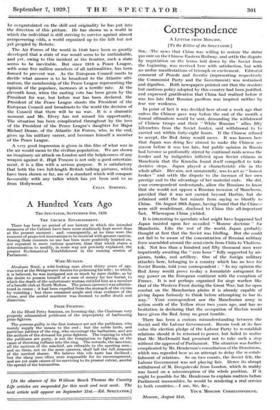Correspondence
A LETTER FROM MOSCOW.
[To the Editor of the SPECTATOR.]
SIR,—The news that China was willing to restore the status quo ante on the Chinese Eastern Railway, and settle the dispute by negotiation on the terms laid down by the Soviet from the beginning, was received here with satisfaction, but with no undue manifestations of triumph or excitement. Editorial comment of Pravda and Isvestia (representing respectively the Communist Party and the Government) was restrained and dignified. Both newspapers pointed out that the resolute but cautious policy adopted by this country had been justified, and expressed gratification that China had realized before it was too late that Russian pacifism was inspired neither by fear nor weakness.
In point of fact it was decided here about a week ago that unless the Chinese gave way before the end of the month a formal ultimatum would be sent, demanding the withdrawal of Chinese troops and their " White Russian " allies fifty kilometres from the Soviet border, said withdrawal to be carried out within forty-eight hours. If the Chinese refused to accept, the Red Army would move. It was known here that Japan was doing her utmost to make the Chinese see reason before it was too late, but public opinion in Russia had become so profoundly stirred by continual raids across the border and by indignities inflicted upon Soviet citizens in Manchuria that the Kremlin found itself compelled to take decisive steps. Japan played a characteristic role in the whole affair. Her aim, not unnaturally, was to act as " honest broker " and settle the dispute to the increase of her own prestige and to the advantage of her material ends. She did. your correspondent understands, allow the Russians to know that she would not oppose a Russian invasion of Manchuria, provided that it was not carried beyond Harbin, but she refrained until the last minute from saying so bluntly to China. On August 26th Japan, having found that the Chinese were still recalcitrant, disclosed to China this all-important fact. Whereupon China yielded.
It is interesting to speculate what might have happened had Japan insisted upon her so-called " Monroe doctrine " for Manchuria. Like the rest of the world, Japan probably thought at first that the Soviet was bluffing. But she could not fail to be aware of the concentration of Russian military force assembled around the semi-circle from Chita to Vladivos- tok. Not less than a hundred and fifty thousand men were impatiently awaiting the " zero hour " fully supported by air- planes, tanks, and artillery. One of the foreign military attaches here, belonging to a country which has no love for Soviet Russia, told your correspondent : " In my opinion the Red Army would prove to-day a formidable antagonist for any power on the European continent with the exception of France. It is not perhaps organized for siege warfare like that of the Western Front during the Great War, but for open combat on the Manchurian plains it is already capable of giving Japan furiously to think before attempting to bar its way." Your correspondent saw the Manchurian army in action south of the Yellow river two years ago, and has no hesitation in declaring that the occupation of Harbin would have given the Red Army no great trouble.
There has been a curious misunderstanding between the Soviet and the Labour Government. Russia took at its face value the election pledge of the Labour Party to re-establish relations should it be returned to power, but failed to realize that Mr. MacDonald had promised not to take such a step without the approval of Parliament. The situation was further complicated by Mr. Henderson's consultation of the Dominions, which was regarded here as an attempt to delay the re-estab- lishment of relations. So on two counts, the Soviet felt, the Labour Government was not playing fair, Hence its abrupt withdrawal of M. Dovgalevski from London, which in reality was based on a misconception of the whole position. If it might be possible for Mr. Henderson to explain matters before Parliament reassembles, he would be rendering a real service to both countries,—I am, Sir, &c.,
YOUR MOSCOW CORRESPONDENT. Moscow, August 31st.
































 Previous page
Previous page